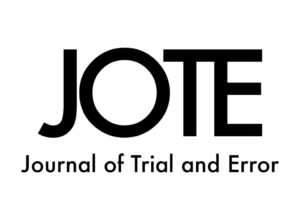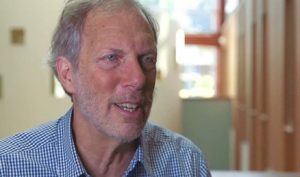Antonie Ladan ~ Onmacht en oorlogsverlangen
Het verlangen naar oorlog komt voort uit onmacht, aldus psychiater Antonie Ladan in Onmacht en oorlogsverlangen. Onmacht is het meest fundamentele aspect van ons leven. We hebben voortdurend te maken met gevoelens van angst, woede en razernij en dan kan een ‘ver weg’ oorlog een grote aantrekkingskracht uitoefenen als kapstok voor onze emoties. Via o.a. Albert Einstein, Sigmund Freud, Gerard Reve, Donald Trump, Vladimir Poetin, Theresa May laat Ladan zien dat oorlog een geriefelijke kapstok kan bieden voor gevoelens van onmacht rond vele situaties waarin we hulpeloos zijn. Een oorlog kan als geroepen komen.
Oorlog kan daarmee iets zijn om naar te verlangen, maar alleen als de werkelijkheid van de oorlog ver weg is en vaag blijft. Als Nederland in oorlog is middels oorlogsmissies, is de afstand tot het front zo groot dat we er in onze dagelijkse leven weinig van hoeven te merken. Zo’n geriefelijke oorlog is ideaal om de gevoelens van haat en machteloze woede niet op elkaar te hoeven richten maar bij een gemeenschappelijke vijand onder te brengen, zodat we samen tegen de vijand kunnen zijn, aldus Ladan. Oorlog beantwoordt in psychologisch opzicht aan een behoefte.
We hoeven ons niet verantwoordelijk te voelen voor onze oorlogsinzet in Libië, Irak en Syrië en de schade die dat veroorzaakt. Er wordt niet veel geschreven over de ‘collateral damage’ van onze daden die voortkomen uit een machteloze verontwaardiging. Wij voelen ons niet verantwoordelijk voor onschuldige burgerslachtoffers en een sterke toename van geweld, chaos en destabilisatie. Wij hebben iets kunnen betekenen voor de buitenwereld, waardoor we ons minder machteloos voelen. De huidige manier van oorlogvoeren, met drones en lasergestuurde bommen, versterkt dat gevoel alleen maar. De afstand tot de daad van het doden wordt opnieuw vergroot.
Een oorlog die met deze wapens wordt gevoerd wordt nog geschikter als kapstok voor onze destructieve behoeften. De oorlogsvoering kan mistig blijven, zodat we ons niet hoeven te schamen. Het maakt ons leven in mentaal opzicht gemakkelijker. Read more
Noam Chomsky: “Worship of Markets” Is Threatening Human Civilization
 We live in dangerous times — no doubt about it. How did we get to such a state of affairs where democracy itself is in a very fragile condition and the future of human civilization itself at stake? In this interview, renowned thinker, Emeritus Professor of Linguistics at MIT and Laureate Professor of Linguistics at the University of Arizona Noam Chomsky, sheds light on the state of the world and the condition of the only superpower left in the global arena.
We live in dangerous times — no doubt about it. How did we get to such a state of affairs where democracy itself is in a very fragile condition and the future of human civilization itself at stake? In this interview, renowned thinker, Emeritus Professor of Linguistics at MIT and Laureate Professor of Linguistics at the University of Arizona Noam Chomsky, sheds light on the state of the world and the condition of the only superpower left in the global arena.
C.J. Polychroniou: Noam, looking at the current state of the world, I think it is not an exaggeration at all to say that we live in ominously dangerous times — and not simply in a period of great global complexity, confusion and uncertainty, which, after all, has been the “normal” state of the global political condition in the modem era. I believe, in fact, that we are in the midst of a whirlpool of events and developments that are eroding our capacity to manage human affairs in a way that is conducive to the attainment of a political and economic order based on stability, justice and sustainability. Indeed, the contemporary world is fraught, in my own mind at least, with perils and challenges that will test severely humanity’s ability to maintain a steady course toward anything resembling a civilized life.
How did we get to such a state of affairs, with tremendous economic inequalities and the resurgence of the irrational in political affairs on the one hand, and an uncanny capacity, on the other, to look away from the existential crises such as global warming and nuclear weapons which will surely destroy civilized life as we know it if we continue with “business as usual”?
Noam Chomsky: How indeed.
The question of how we got to this state of affairs is truly vast in scope, requiring not just inquiry into the origin and nature of social and cultural institutions but also into depths of human psychology that are barely understood. We can, however, take a much more modest stab at the questions, asking about certain highly consequential decisions that could have been made differently, and about specific cases where we can identify some of the roots of looking away.
The history of nuclear weapons provides some striking cases. One critical decision was in 1944, when Germany was out of the war and it was clear that the only target was Japan. One cannot really say that a decision was made to proceed nevertheless to create devices that could devastate Japan even more thoroughly, and in the longer term threaten to destroy us as well. It seems that the question never seriously arose, apart from such isolated figures as Joseph Rotblat — who was later barred reentry to the U.S.
Another critical decision that was not made was in the early 1950s. At the time, there were still no long-range delivery systems for nuclear weapons (ICBMs). It might have been possible to reach an agreement with Russia to bar their development. That was a plausible surmise at the time, and release of Russian archives makes it seem an even more likely prospect. Remarkably, there is no trace of any consideration of pursuing steps to bar the only weapons systems that would pose a lethal threat to the U.S., so we learn from McGeorge Bundy’s standard work on the history of nuclear weapons, with access to the highest-level sources. Perhaps still more remarkably, there has, to my knowledge, been no voiced interest in this astonishing fact. Read more
We Need A Green New Deal To Defeat Fascism And Reverse Inequality
In the debate about what strategy to adopt to combat climate change, the Green New Deal has quickly become the new buzzword on the left. Is it an insufficient social-democratic response to the present crisis, or is it, in fact, the only realistic project we have to save the planet? Robert Pollin, distinguished professor of economics and co-director of the Political Economy Research Institute at the University of Massachusetts at Amherst, is a leading proponent of a green future and he shared his vision of the Green New Deal in the interview below, which appeared originally in Swedish in the left paper Flamman.
Jonas Elvander: You are one of the most well-known scientific spokespersons for a so-called “Green New Deal.” Can you explain what that means?
Robert Pollin: In my view, the core features of the Green New Deal are quite simple. They consist of a worldwide program to invest between 2-3 percent of global GDP every year to dramatically raise energy efficiency standards and equally dramatically expand lean renewable energy supplies.
Here is why this is the core of the Green New Deal. Last October 2018, the Intergovernmental Panel on Climate Change (IPCC) issued a new report emphasizing the imperative of limiting the rise in the global mean temperature as of 2100 by 1.50C [1.5 degrees Celsius] only, as opposed to 2.00C. The IPCC now concludes that limiting the global mean temperature increase to 1.50C will require global net CO2 [carbon dioxide] emissions to fall by about 45 percent as of 2030 and reach net zero emissions by 2050. These new figures from the IPCC provide a clear and urgent framework for considering alternative approaches for fighting climate change.
To make real progress on climate stabilization, the single most critical project at hand is straightforward: to cut the consumption of oil, coal and natural gas dramatically and without delay, and to eliminate the use of fossil fuels altogether by 2050. The reason this is the single most critical issue at hand is because producing and consuming energy from fossil fuels is responsible for generating about 70 percent of the greenhouse gas emissions that are causing climate change. Carbon dioxide (CO2) emissions from burning coal, oil and natural gas alone produce about 66 percent of all greenhouse gas emissions, while another 2 percent is caused mainly by methane leakages during extraction. Read more
De ondergewaardeerde Willem Willink
Willem Wilmink (1936 – 2003) was niet alleen een van de aardigste mensen die ik ooit ontmoet heb, hij is ook een van de begaafdste dichters en tekstdichters. Aanvankelijk werd hij vooral bekend van zijn versjes voor kinderen en bijdragen aan jeugdprogramma’s als De Stratemakeropzeeshow, De Film van Ome Willem en J.J. de Bomshow voorheen De Kindervriend.
Maar hij schreef ook gedichten en liedjesteksten voor grote mensen. Soms bracht hij die zelf ten gehore. Ik heb eenmaal mogen horen hoe hij er, zichzelf op de accordeon begeleidend, met breekbare stem een paar zong.
De kwaliteit van zijn werk drong langzaam tot een groter publiek door bijvoorbeeld De oude school van cabaret Don Quishocking.
Ach, zou die oude school er nog wel zijn,
kastanjebomen op het plein,
de zwarte deur,
platen van ridders met een kruis
en van Goejanverwellesluis,
geheel in kleur
Herman van Veen komt de eer toe Wilmink misschien niet ontdekt te hebben, maar dan toch als groot tekstdichter erkend te hebben. Hij nam prachtige teksten in zijn programma’s op, met prachtige beelden als in De kraanvogels
Soms, soms denk ik wel dat de soldaten
Die in de oorlogen gevallen zijn
Niet onder witte kruisen zijn begraven
Maar dat zij kraanvogels geworden zijn
Ze roepen ons uit lang voorbije tijden
Hun hese stemmen roepen in hun vlucht
‘t Is misschien daarom dat wij zo dikwijls kijken
Diep in gedachten naar de trieste lucht
of in Achterlangs
De meeste treinen rijden achterlangs het leven
Je ziet een schuurtje met een fiets ertegenaan
Een kleine jongen is nog op, hij mag nog even.
Je ziet een keukendeur een eindje openstaan.
Als je maar niet door deze trein werd voortgedreven,
zou je daar zonder meer naar binnen kunnen gaan
JOTE ~ The Journal Of Trial And Error
 The Journal of Trial and Error aims to close the gap between what is researched and what is published. In scientific practice, trial and error is a fundamental process of learning and discovery. Therefore, we want to make public the lessons of the struggles in research. We are convinced about the productive role of errors, and so we aim to publish answers to the question “what went wrong?”, as well as problematising this question by reflecting on what failure means in science. You can read our manifesto to learn further about our goals, and the benefits of publishing errors.
The Journal of Trial and Error aims to close the gap between what is researched and what is published. In scientific practice, trial and error is a fundamental process of learning and discovery. Therefore, we want to make public the lessons of the struggles in research. We are convinced about the productive role of errors, and so we aim to publish answers to the question “what went wrong?”, as well as problematising this question by reflecting on what failure means in science. You can read our manifesto to learn further about our goals, and the benefits of publishing errors.
From the Manifesto
We state that …
Trial and Error is the elementary process in Science by which knowledge is acquired. We differentiate between two types of scientific Trial and Error processes:
– Methodological errors in a practical sense, driving improvement in the understanding and application of techniques. These errors are here understood in a broad sense, those that go beyond the learning of the individual researcher and have an impact at the scale of the scientific community.-
Conceptual flaws, arising from hypothesis being confronted with conflicting observations. When the initial hypotheses are inappropriate in the face of empirical evidence, scientists improve or reject theoretical frameworks by developing alternative theses aimed at increasing empirical adequacy. Not only hits (positive results), but also misses (negative results) are key to scientific progress.
We identify three core problems in today’s Science. Namely, …
… a public image of Science based on breakthrough discoveries, fascinating images, and clear results. This reputation comes at a cost. Both scientists themselves, as well as philosophers, sociologists and historians of science have increasingly been highlighting the importance of science in the making. A more faithful picture of Science, the one of practices and fine-tuning methodologies, seems to be at odds with the unrealistic public image of big-discovery Science.
… a gap between what is published and what is researched. We know positive publication bias pressures scientists to conceal methodological mistakes and discard research containing negative findings, threatening proper interpretation. In the face of failed research —outcomes of Science that do not meet the initial aim of the individual researchers— scientists have two options at hand: not publishing or framing the results as productive by, for example, adding ad-hoc hypotheses in a potentially inadequate manner. This point is a consequence of the expectations of big-discovery Science and the publish-or-perish politics of this Science.
… a replication crisis. Since scientists validate their results in terms of replicability, the present-day situation of unreplicable experiments is a serious problem. Debate on this replication crisis has focused on the misuse of statistics by scientists, on methodological carelessness, or theoretical inappropriateness. Only a few venues are attentive to the potential harm.
[…] The complete Manifesto: https://www.jtrialerror.com/the-manifesto-for-trial-and-error-in-science/
URL Journal: https://www.jtrialerror.com/
Noam Chomsky: Trump Is Consolidating Far-Right Power Globally
 It is no easy task to make sense of U.S. foreign policy in the current era. Trump is wildly unpredictable and lacks any semblance of a coherent view of world affairs, appearing to believe that all it takes is “the art of the deal” to turn “enemies” into friends. Meanwhile, since Trump’s rise to power, the end of U.S. hegemony has come into sight.
It is no easy task to make sense of U.S. foreign policy in the current era. Trump is wildly unpredictable and lacks any semblance of a coherent view of world affairs, appearing to believe that all it takes is “the art of the deal” to turn “enemies” into friends. Meanwhile, since Trump’s rise to power, the end of U.S. hegemony has come into sight.
In the exclusive Truthout interview below, renowned public intellectual Noam Chomsky — one of the world’s most astute critics of U.S. foreign policy in the postwar era — sheds considerable light on the current state of U.S. foreign policy, including Trump’s relations with the leaders of North Korea, Russia and China, as well as his so-called “Middle East Peace Plan.”
C.J. Polychroniou: Noam, in 2016 Trump called U.S foreign policy “a complete and total disaster,” claiming that previous administrations in the post-Cold War era were guided by unrealistic expectations that damaged America’s national interests. Since taking office, he has withdrawn the country from a series of international agreements, demanding that countries pay for U.S. protection, and seeking to advance U.S economic interests through tariffs and protectionism. These moves have led many analysts to speak of a new era in U.S. relations with the world. What’s your own take on Trump’s foreign policy?
Noam Chomsky: One of the most appropriate comments I’ve seen on Trump’s foreign policy appeared in an article in The New Republic written by David Roth, the editor of a sports blog: “The spectacle of expert analysts and thought leaders parsing the actions of a man with no expertise or capacity for analysis is the purest acid satire — but less because of how badly that expert analysis has failed than because of how sincerely misplaced it is … there is nothing here to parse, no hidden meanings or tactical elisions or slow-rolled strategic campaign.”
That seems generally accurate. This is a man, after all, who dismisses the information and analyses of his massive intelligence system in favor of what was said this morning on “Fox and Friends,” where everyone tells him how much they love him. With all due skepticism about the quality of intelligence, this is sheer madness considering the stakes.
And it continues, in ways that are almost surreal. At the recent G20 conference, Trump was asked about Putin’s statement that Western liberalism is obsolete. Trump assumed he must be talking about California: Western liberalism. Putin “may feel that way,” Trump responded: “He sees what’s going on. And I guess, if you look at what’s happening in Los Angeles, where it’s so sad to look; and what’s happening in San Francisco and a couple of other cities which are run by an extraordinary group of liberal people.” Read more





